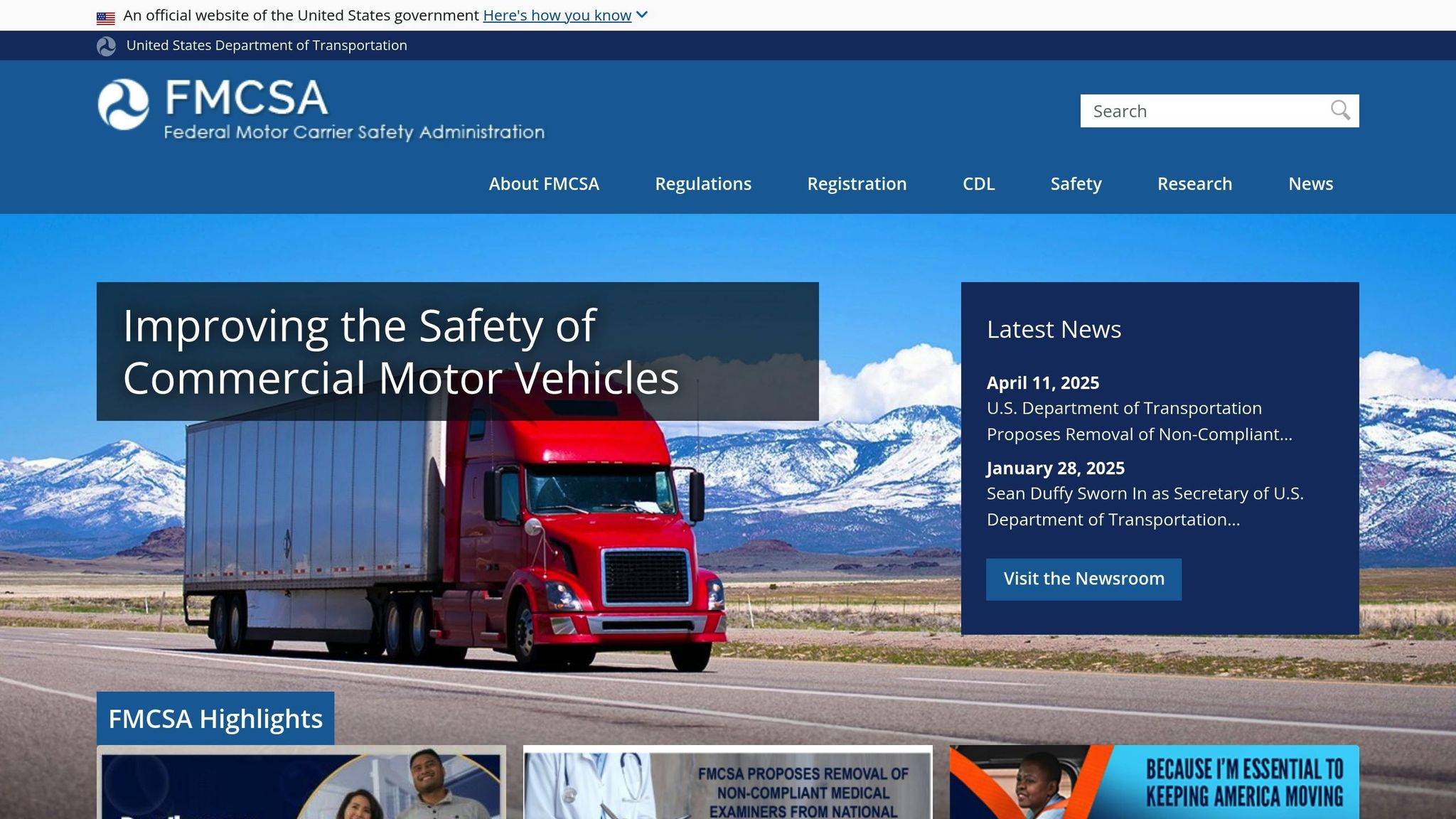Federal Moving Insurance Laws: Consumer Rights Overview

When moving across state lines, federal laws protect your belongings and outline your rights. Here's what you need to know:
- Insurance Coverage: Moving companies must offer two types of coverage:
- Released Value Protection: Free but limited to $0.60 per pound.
- Full Value Protection: Covers repair, replacement, or cash settlement but costs extra.
- Claims Process: File damage claims within 9 months of delivery. Movers must respond within 30 days and resolve claims within 120 days.
- FMCSA Oversight: The Federal Motor Carrier Safety Administration ensures movers are licensed, insured, and follow federal rules.
- Interstate vs. Intrastate Moves: Interstate moves follow federal laws, while intrastate moves are governed by state-specific regulations.
Quick Tip: Document your items, check mover credentials, and choose the right insurance option for peace of mind.
How To Choose The Valuation Coverage For Your Move
Your Legal Rights When Moving
Federal laws ensure that consumers are protected when hiring professional movers. These rights establish clear rules for handling issues like lost or damaged items, ensuring transparency and fair treatment throughout the process.
How to File Damage Claims
If your belongings are damaged or lost during a move, acting quickly and keeping detailed records is crucial. Here's how to handle it:
- Document damage immediately: Inspect your items as soon as they’re delivered.
- Take clear photos: Capture detailed images of any damage.
- Save all paperwork: Keep contracts, inventories, and other moving documents.
- File a written claim: Submit a detailed claim to your mover, including repair or replacement estimates.
- Provide specifics: Include the item's pre-move condition, value, and details about the damage.
- Keep copies: Retain all correspondence and note submission dates.
If the moving company doesn’t resolve your claim, there are additional steps you can take.
Legal Options for Disputes
When disputes over claims aren’t resolved, you have several options to consider:
- Arbitration: Movers are required to offer arbitration for disputes. This method is often quicker and less expensive than going to court.
- FMCSA Complaint: If the mover violates federal rules or refuses to honor insurance obligations, you can file a complaint with the Federal Motor Carrier Safety Administration (FMCSA).
- Legal Action: For unresolved disputes, you can take the matter to small claims court (for eligible amounts), civil court, or seek help from your state’s consumer protection agency.
Tip: Before escalating to legal action, try resolving issues directly with the moving company. Keep a record of all communications, including dates, times, and the names of company representatives. This documentation can be useful if further steps are needed.
Required Insurance Coverage
Federal law mandates that moving companies provide two types of insurance coverage to safeguard your belongings during transit. Here's what you need to know to make an informed decision.
Full Value Protection
This option ensures your belongings are covered for their full value. If an item is damaged, movers can either repair it, replace it, or offer a cash settlement equal to its replacement cost.
Released Value Protection
Released Value Protection is the standard coverage included with your move, as required by federal law. However, it provides minimal protection. Reimbursement for lost or damaged items is calculated based on weight, which often results in lower compensation compared to Full Value Protection. The table below highlights the key differences between these two options.
Comparing Coverage Options
| Feature | Full Value Protection | Released Value Protection |
|---|---|---|
| Cost | Requires an additional fee | Included at no extra charge |
| Coverage Amount | Covers full replacement value | Limited, weight-based reimbursement |
| Deductible Options | May offer deductible options | No deductibles typically apply |
| High-Value Items | May need separate declaration for high-value items | No special provisions for such items |
| Claims Process | Options include repair, replacement, or cash settlement | Based on the item's weight |
Pro Tip: While Released Value Protection is free, items like electronics, artwork, and high-end furniture are better protected under Full Value Protection. Consider upgrading for peace of mind.
sbb-itb-290b89d
Law Enforcement and Compliance
The Federal Motor Carrier Safety Administration (FMCSA) plays an important role in safeguarding consumers during interstate moves by strictly enforcing moving insurance laws and regulations.
FMCSA Enforcement Methods

The FMCSA uses several methods to ensure moving companies meet federal insurance standards. These include:
- Regular Audits: Moving companies must keep detailed records of their insurance coverage and claims.
- Tracking Consumer Complaints: A database is used to monitor patterns of insurance-related violations.
- Compliance Reviews: On-site inspections verify that companies have the proper insurance documentation.
- Penalties: Companies can face fines of up to $27,000 per violation for failing to comply with insurance regulations.
To operate legally, moving companies must display their USDOT number and maintain active insurance policies. Serious violations can lead to suspension or revocation of their operating authority. While these enforcement measures are in place, it’s crucial to know the exact steps for filing a claim if issues arise.
Steps to File Claims
Filing a claim requires a clear, documented process to protect your rights under federal moving insurance laws. Acting quickly and thoroughly is key.
1. Initial Documentation
- Take note of the condition of your items before and after the move.
- Keep all moving-related documents.
- Gather evidence such as photos or receipts to support your claim.
2. Submit Written Notice
File a written claim with the moving company within 9 months of delivery. Include:
- A detailed list of damaged or lost items.
- Photos and supporting documents.
- The original bill of lading number.
- An estimated value for the affected items.
3. Keep Records of All Communications
Save copies of all emails, letters, and notes from phone calls regarding your claim. Document every interaction to ensure nothing is overlooked.
Claims Process Timeline
Knowing the timeline for resolving claims can help you set realistic expectations:
| Stage | Timeframe | Required Action |
|---|---|---|
| Initial Filing | Within 9 months of delivery | Submit a written claim with all necessary documentation. |
| Acknowledgment | 30 days | The company must confirm receipt of your claim. |
| Investigation | 60-120 days | The company reviews your evidence and assesses the situation. |
| Settlement Offer | Within 120 days | The company must make a settlement offer. |
| Appeal Period | 30 days | You can accept or dispute the settlement offer. |
Important: Moving companies must respond to your claim in writing within 30 days of receiving it and resolve it within 120 days. If they fail to respond or you’re unhappy with the outcome, you can escalate the issue to the FMCSA’s Consumer Protection Division.
Proper documentation and timely action are essential for a successful claim. Always keep copies of all claim-related materials and follow up regularly to track the progress of your case.
Tips for Moving Success
Planning ahead and understanding your rights under federal moving insurance laws can make your move much easier. Below are some practical steps and tips to help ensure everything goes smoothly.
Your Moving Day Checklist
-
Pre-Move Assessment
Create a detailed inventory of your belongings. Take photos and note estimated values for each item. Empty drawers and secure fragile items to prevent damage. -
Insurance Selection
Look into your insurance options before committing to a plan. Understand the difference between Basic Released Value coverage and Full Value Protection to choose what works best for your situation. -
Documentation Review
Keep key documents handy, including:- Bill of Lading
- Inventory List
- Insurance Certificates
- Valuation Coverage Agreement
- Contact information for your moving company
Extra Insurance Options
In addition to the standard coverage, think about whether extra insurance is worth it based on your specific needs. Factors to consider include:
- The value of your items (especially irreplaceable ones)
- The distance of your move
- Any unique risks involved
Moving with MOD24

For a more streamlined experience, consider using a professional platform like MOD24. They connect you with licensed, verified, and insured movers, offering:
- Access to trusted moving companies
- Clear and transparent insurance documentation
- Online booking with straightforward valuation coverage options
- Premium customer support for insurance-related questions
MOD24 members enjoy perks like $100 TV insurance and comprehensive coverage for long-distance moves. Their VIP concierge service can help you navigate insurance requirements, while their step-by-step guide ensures you stay on top of special handling instructions and essential documents.
Summary
Federal moving insurance laws are in place to safeguard consumers by requiring movers to be licensed, insured, and to follow clear claims procedures. Here's a recap of how these laws protect you:
- Licensed and Insured Movers: Movers must be properly licensed and insured to operate legally.
- Detailed Documentation: Keeping thorough records can support any claims you need to make.
- Clear Communication: Set clear expectations with your mover and report any changes immediately to prevent misunderstandings.
Key Protection Steps
- Check Credentials: Verify the mover's licensing and insurance status. Compare quotes to find the best coverage and rates.
- Document Your Items: Take photos and note the value of your belongings before the move.
- Save Important Records: Keep copies of all contracts, receipts, and communications related to your move.
Additional Support
Using a trusted platform like MOD24 can make the process easier. MOD24 connects you with licensed and insured movers, lets you compare quotes, read live reviews, and get estimated rates.

F1 to H1B: Steps for Tech Professionals
Switching from an F1 visa (student) to an H1B visa (work) is a key step for international tech prof...

10 Tips for Negotiating Tech Relocation Packages
Relocating for a tech job? Here’s a quick guide to negotiating a strong relocation package that cov...

How Highways Shaped Suburban Growth
The Interstate Highway System, launched in 1956, transformed American life by connecting cities, fu...